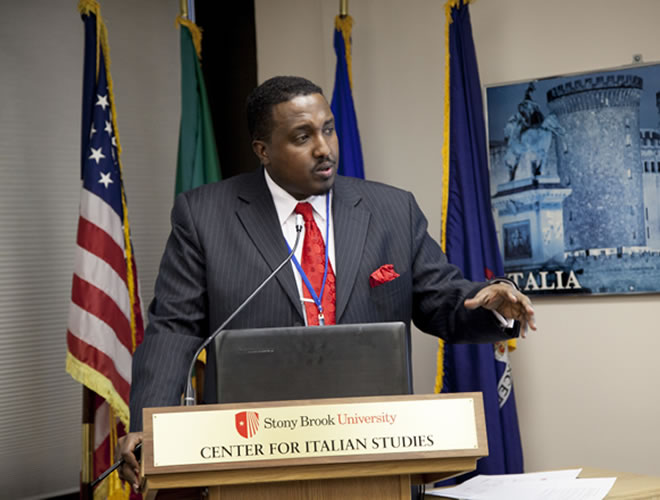
Awale Kullane, a minister-counselor to the United Nations for Somalia, comes to Stony Brook to talk about the state of his home country. (ANUSHA MOOKHERJEE / THE STATESMAN)

Ryan Wolf
Wednesday, March 05, 2014
For many, mention of Somalia conjures images of piracy and movies like “Captain Phillips.” Somali diplomat Awale Kullane, however, tried to present a more intricate perspective at a recent event hosted by the College of Leadership and Service.
“I want students to see Somalia, not only in the eyes of what they see in the media, but what it really is,” Kullane said. He is a Minister-Counselor to United Nations for Somalia and Deputy Head of Mission at the Somali embassy in Beijing.
For six consecutive years, Somalia has been listed as number one on the Failed State Index of the Foreign Policy and The Global Fund for Peace.
Kullane said Somalia’s present day turmoil began with the fall of a dictatorship of 21 years in 1991, which led to civil war between militia groups. Sporadic peace conferences from 1991 to 2004 failed to disarm these militias.
In 2004, Somalia saw the creation of the Transitional Federal Government, which lasted until 2012 and had the nation’s first constitution for a republic. The transitional government was replaced in 2012 by the current Federal Republic.
Kullane said creating a republic and developing a parliament has been difficult. “What you have now in your country, people take it for granted. It’s very hard to develop and very hard to maintain,” he said.
One of the most serious threats to the country’s stability is the Al-Shabab militant group. The group, which is linked to Al-Qaeda, has attempted to take over Somali cities for several years and is still in control of some areas of the country.
Al-Shabab attacked the Presidential Palace just last week.
“This is common for us, but we are winning the war against Al-Shabab by making sure they don’t have strongholds,” Kullane said.
Somalia and many other African nations have drawn international attention recently due to human rights violations and anti-gay laws that make homosexuality punishable by up to three years in prison. In Southern Somalia, homosexuality is punishable by death.
Kullane said he hopes his country can be improved through the exchange of ideas and conversation, which is his reasoning behind his decision to visit Stony Brook.
“It is an opportunity to meet with young minded students and to learn, as well, the perspective people have of us and what we need to change,” he said.
The presentation with Kullane was just one in a series of events intended to boost Stony Brook University’s International Relations program.
Muhammed Mosen, a sophomore studying political science and economics and who helped to organize Kullane’s visit, said that “in order to build a more robust international relations program, we have to have diplomats visit the university and provide the firsthand account and views of the international system.”
The International Leader Speaker Series will host another diplomat from Armenia on March 12.